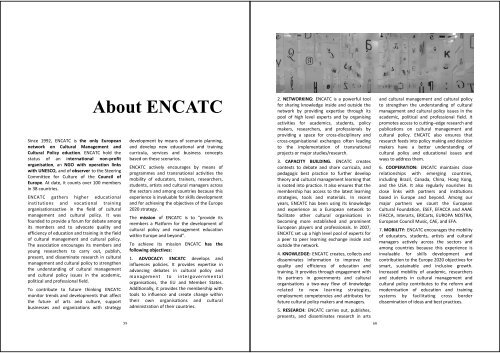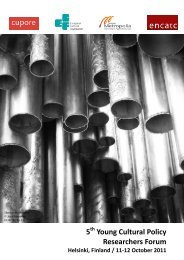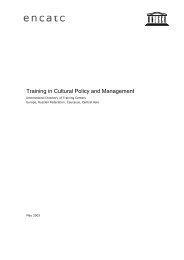Reader - pdf format - Encatc
Reader - pdf format - Encatc
Reader - pdf format - Encatc
- TAGS
- reader
- encatc
- www.encatc.org
You also want an ePaper? Increase the reach of your titles
YUMPU automatically turns print PDFs into web optimized ePapers that Google loves.
Since 1992, ENCATC is the only European<br />
network on Cultural Management and<br />
Cultural Policy eduction. ENCATC hold the<br />
status of an international non‐profit<br />
organisation, an NGO with operation links<br />
with UNESCO, and of observer to the Steering<br />
Committee for Culture of the Council of<br />
Europe. At date, it counts over 100 members<br />
in 38 countries.<br />
ENCATC gathers higher educational<br />
institutions and vocational training<br />
organisationsactive in the field of cultural<br />
management and cultural policy. It was<br />
founded to provide a forum for debate among<br />
its members and to advocate quality and<br />
efficiency of education and training in the field<br />
of cultural management and cultural policy.<br />
The association encourages its members and<br />
young researchers to carry out, publish,<br />
present, and disseminate research in cultural<br />
management and cultural policy to strengthen<br />
the understanding of cultural management<br />
and cultural policy issues in the academic,<br />
political and professional field.<br />
To contribute to future thinking ENCATC<br />
monitor trends and developments that affect<br />
the future of arts and culture, support<br />
businesses and organizations with strategy<br />
About ENCATC<br />
59<br />
development by means of scenario planning,<br />
and develop new educational and training<br />
curricula, services and business concepts<br />
based on these scenarios.<br />
ENCATC actively encourages by means of<br />
programmes and transnational activities the<br />
mobility of educators, trainers, researchers,<br />
students, artists and cultural managers across<br />
the sectors and among countries because this<br />
experience is invaluable for skills development<br />
and for achieving the objectives of the Europe<br />
2020 strategy.<br />
The mission of ENCATC is to “provide its<br />
members a Platform for the development of<br />
cultural policy and management education<br />
within Europe and beyond”.<br />
To achieve its mission ENCATC has the<br />
following objectives:<br />
1. ADVOCACY: ENCATC develops and<br />
influences policies. It provides expertise in<br />
advancing debates in cultural policy and<br />
management to intergovernmental<br />
organisations, the EU and Member States.<br />
Additionally, it provides the membership with<br />
tools to influence and create change within<br />
their own organisations and cultural<br />
administration of their countries.<br />
2. NETWORKING: ENCATC is a powerful tool<br />
for sharing knowledge inside and outside the<br />
network by providing expertise through its<br />
pool of high level experts and by organising<br />
activities for academics, students, policy<br />
makers, researchers, and professionals by<br />
providing a space for cross‐disciplinary and<br />
cross‐organisational exchanges often leading<br />
to the implementation of transnational<br />
projects or major studies/research.<br />
3. CAPACITY BUILDING. ENCATC creates<br />
contexts to debate and share curricula, and<br />
pedagogic best practice to further develop<br />
theory and cultural management learning that<br />
is rooted into practice. It also ensures that the<br />
membership has access to the latest learning<br />
strategies, tools and materials. In recent<br />
years, ENCATC has been using its knowledge<br />
and experience as a European network to<br />
facilitate other cultural organisations in<br />
becoming more established and prominent<br />
European players and professionals. In 2007,<br />
ENCATC set up a high level pool of experts for<br />
a peer to peer learning exchange inside and<br />
outside the network.<br />
4. KNOWLEDGE: ENCATC creates, collects and<br />
disseminates in<strong>format</strong>ion to improve the<br />
quality and efficiency of education and<br />
training. It provides through engagement with<br />
its partners in governments and cultural<br />
organisations a two‐way flow of knowledge<br />
related to new learning strategies,<br />
employment competencies and attributes for<br />
future cultural policy makers and managers.<br />
5. RESEARCH: ENCATC carries out, publishes,<br />
presents, and disseminates research in arts<br />
60<br />
and cultural management and cultural policy<br />
to strengthen the understanding of cultural<br />
management and cultural policy issues in the<br />
academic, political and professional field. It<br />
promotes access to cutting–edge research and<br />
publications on cultural management and<br />
cultural policy. ENCATC also ensures that<br />
research feeds into policy making and decision<br />
makers have a better understanding of<br />
cultural policy and educational issues and<br />
ways to address them.<br />
6. COOPERATION: ENCATC maintains close<br />
relationships with emerging countries,<br />
including Brazil, Canada, China, Hong Kong,<br />
and the USA. It also regularly nourishes its<br />
close links with partners and institutions<br />
based in Europe and beyond. Among our<br />
major partners we count the European<br />
Cultural Foundation, ESEF, EFACCA and AAAE<br />
IFACCA, Interarts, ERICarts, EUROPA NOSTRA,<br />
European Council Music, CAE, and EFA.<br />
7. MOBILITY: ENCATC encourages the mobility<br />
of educators, students, artists and cultural<br />
managers actively across the sectors and<br />
among countries because this experience is<br />
invaluable for skills development and<br />
contribution to the Europe 2020 objectives for<br />
smart, sustainable and inclusive growth.<br />
Increased mobility of academic, researchers<br />
and students in cultural management and<br />
cultural policy contributes to the reform and<br />
modernisation of education and training<br />
systems by facilitating cross border<br />
dissemination of ideas and best practices.






